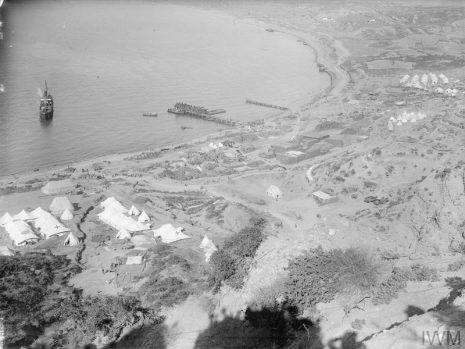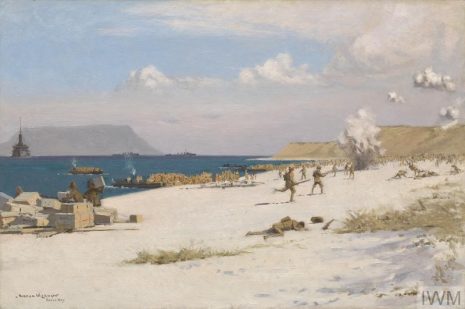The Gallipoli Campaign, 1915-1916
Much like the Somme offensive of 1916, the Gallipoli campaign of 1915 has, amongst historians of the war, become a byword for poor planning, inadequately defined goals, overconfidence and haphazard execution. Notoriously conceived by Winston Churchill whilst First Lord of the Admiralty in spite of the protestations of Jacky Fisher, the campaign was designed to secure the Black Sea Straits to supply Russia, seize Constantinople and draw Greece and Bulgaria into the war on the Allied side. In practice, the bombardment failed to knock out the Ottoman batteries and the rapid victories that had been expected failed to materialise against an opposition that has been seriously underestimated.

© IWM (Q 13615) Panoramic view of Ocean Beach, north of Ari Burnu and Anzac Cove, looking towards Suvla Bay. In the foreground is No. 1 Australian Stationary Hospital, in the centre are the Ordnance and Supply Stores, and in the distance No. 13 Casualty Clearing Station.
Worse was to come. Despite the low likelihood of success, the offensive was relaunched on no fewer than three separate occasions over the summer months. The most notable of these was during August when, after some initial success, the Allies were thrown back into their trenches on the beaches of Anzac and Suvla Cove. It is here that the now-notorious dysentery outbreak worsened, corpses piled up and soldiers reported that it was impossible to eat without being covered alive in flies. News of the debacle did not take long to reach London, partly courtesy of Keith Murdoch, father of Rupert, and the political repercussions were widespread culminating in the fall of the Asquith government, the exile of Churchill and, perhaps most intriguingly, a ‘baptism of fire’ for the national consciences of Australia and New Zealand.

© IWM ART 2452 Troops Landing on C Beach, Suvla Bay, Later in the Day, 7th August 1915, by Norman Wilkinson
Fourteen Old Alleynians lost their lives in the campaign, eight of whom fell in the ill-conceived August offensive and two more in the insanitary conditions that followed. One of these was Charles Collet, a Flight Commander in the Royal Naval Air Service. Collet had been awarded the DSO in 1914 for conducting the first long distance air raid into Germany. In heavy fog, Collet led a four plane attack on the Zeppelin sheds in Dusseldorf, the first of its kind. Collet also gained contemporary notoriety as the first Naval Officer to loop-the-loop! He died aboard the hospital ship Gascon and is commemorated at the Helles memorial.
David Flower
Member of Staff, Dulwich College